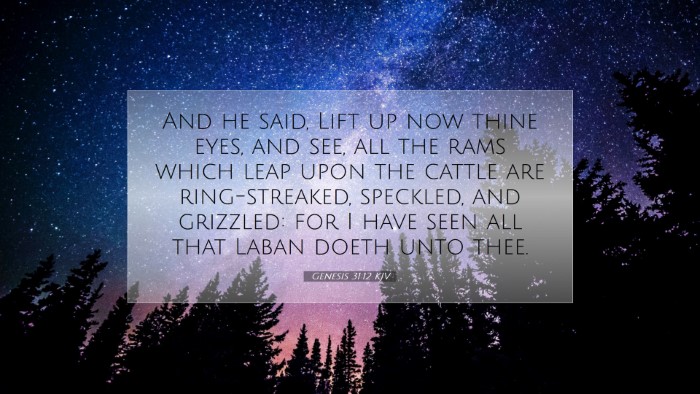Bible Commentary on Genesis 31:12
Genesis 31:12 (KJV): "And he said, Lift up now thine eyes, and see, all the rams which leap upon the cattle are ringstraked, speckled, and grisled: for I have seen all that Laban doeth unto thee."
Contextual Overview
The verse in question is part of the narrative where Jacob is in a complex relationship with his father-in-law Laban. Having worked for Laban for many years, Jacob is now faced with the challenge of securing his future and that of his family. God speaks to Jacob in this pivotal moment, revealing insights pertinent to Jacob’s prosperity amidst his tribulation.
The Divine Revelation
Matthew Henry's Commentary: Henry emphasizes that God's instruction came as a direct revelation to Jacob. This is significant as it underscores God’s active involvement in Jacob’s life. Jacob is called to 'lift up his eyes' not merely to see but to understand the divine provision that surrounds him. It’s not just about the physical rams but the spiritual insight that God is offering.
Albert Barnes' Notes: Barnes points out the importance of the specific characteristics of the rams—'ringstraked, speckled, and grisled'—which not only signify God’s blessing but also symbolize the peculiar providences at play. This detailed attention to the animals reflects God’s ability to orchestrate outcomes in the midst of human deceit and manipulation.
Understanding God's Promises
Adam Clarke's Commentary: Clarke adds depth by discussing the conditional nature of God's blessings. It was Jacob's faith and obedience that positioned him to receive this revelation. God’s mention of observing all that Laban had done illustrates His omniscience and the assurance that He watches over those who feel oppressed.
Spiritual Implications
- Faithfulness in Adversity: The text shows that even in times of trouble, faithfulness to God can lead to His blessings. Jacob’s endurance and God-honoring conduct in a difficult situation manifest in God's response to him.
- Seeing Beyond the Natural: The command to lift up his eyes conveys the need for spiritual vision. Followers of Christ are often called to look beyond their immediate circumstances and trust in God's broader plan.
- Divine Justice: God promises to confront Laban’s unrighteousness. The verse reassures believers that God sees the injustices done against them; thus, they can find comfort in His sovereign oversight.
Application for Leaders and Scholars
This passage provides rich material for theological reflection and pastoral application. It encourages leaders to present the character of God as one who engages actively in the lives of His followers.
Practical Insights for Pastors:
- Encouragement from God's Presence: Pastors can draw from this narrative to remind congregations of God’s continual presence. Preaching on the importance of looking to God in distress can foster greater hope and resilience in the church community.
- Teaching on Observance of God's Work: Pastors are urged to cultivate awareness among believers about recognizing God's handiwork in their lives. The interaction between Jacob and God invites discussion on the need for believers to be observant and attuned to God's movements in their contexts.
Reflection for Students and Theologians:
- The Theme of Divine Provision: Scholars can explore the theological implications of God's provisions in adversity. Analyzing the character of God as one who provides despite challenging circumstances can form a cornerstone of practical theology.
- Interplay of Free Will and Divine Sovereignty: This passage opens a discussion on how human choices, like Jacob's decisions lead to consequences that are interwoven with God's sovereignty. The balance of human agency and divine orchestration is ripe for academic exploration.
Conclusion
Genesis 31:12 encapsulates profound lessons about faith, divine engagement, and the reassurance of God’s presence amidst human trials. By considering the reflections from commentaries by Matthew Henry, Albert Barnes, and Adam Clarke, readers can build a deeper understanding of how God continues to interact with His people today. Such insights offer valuable resources for pastoral care, theological study, and personal growth in faith.


